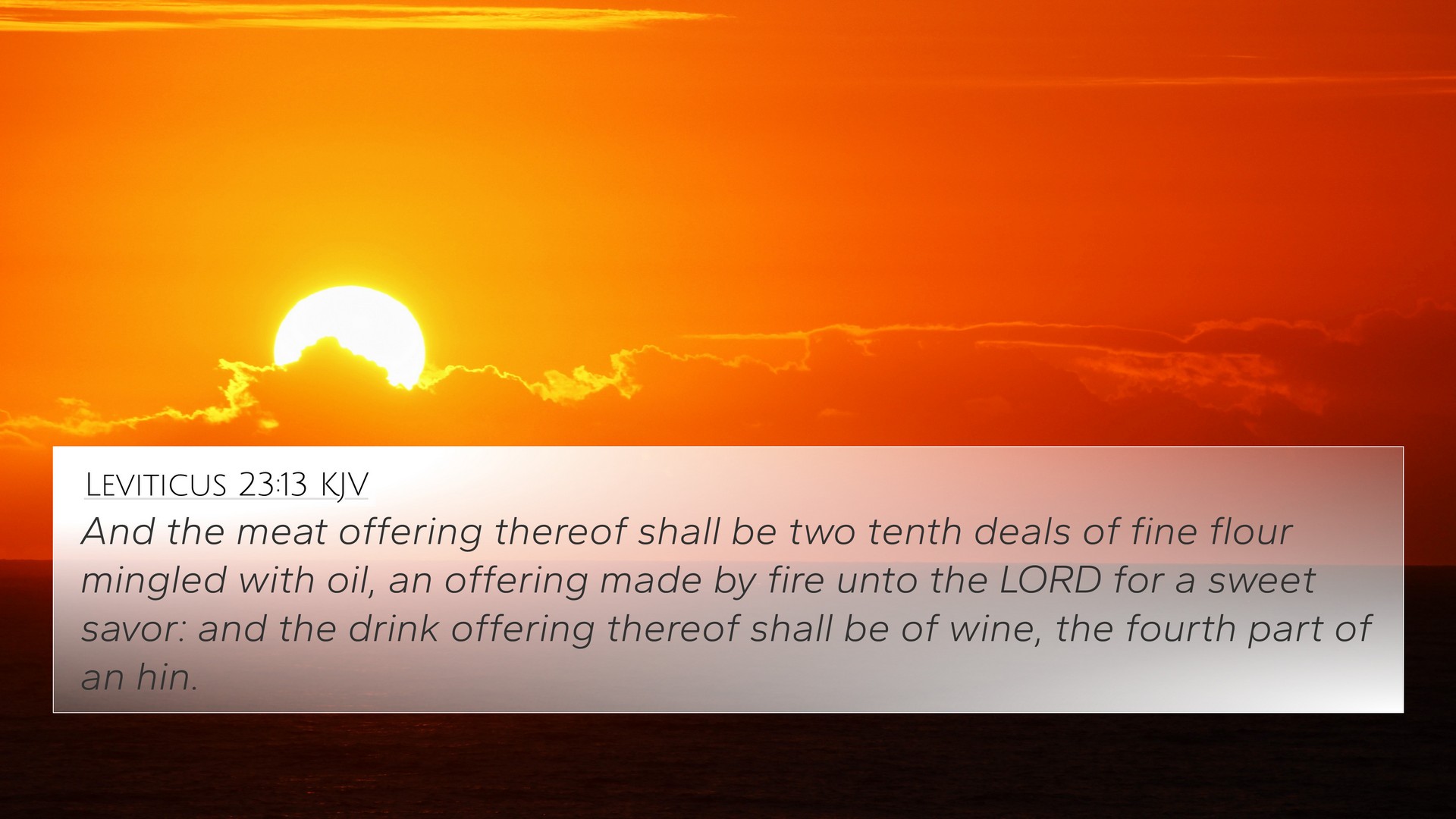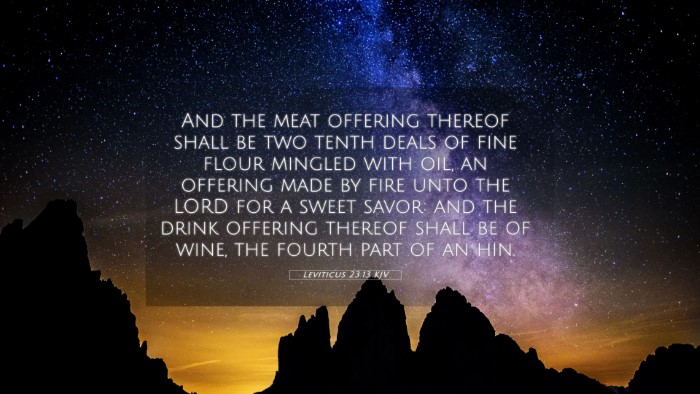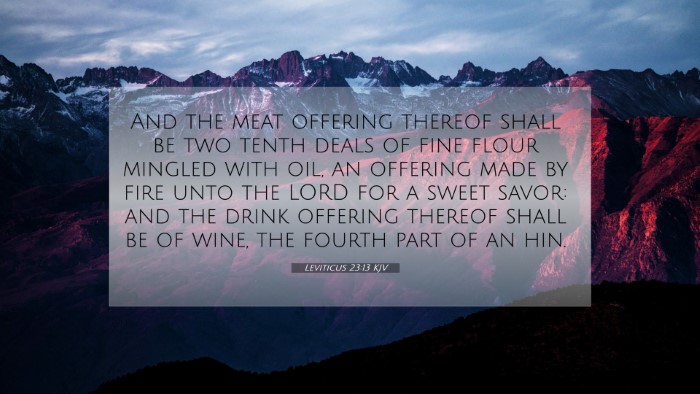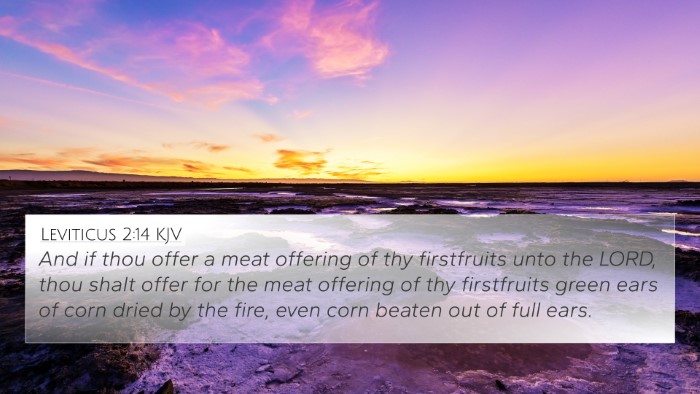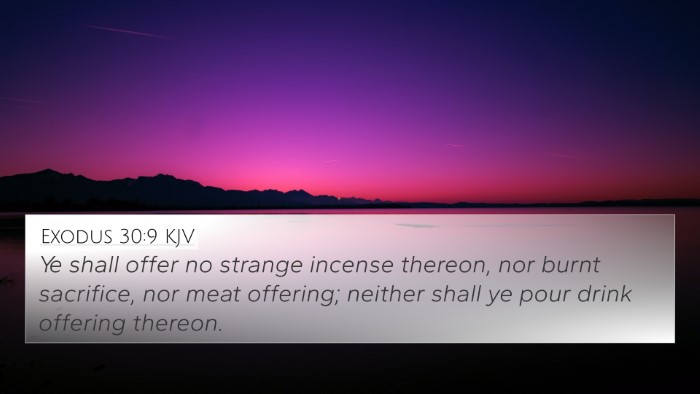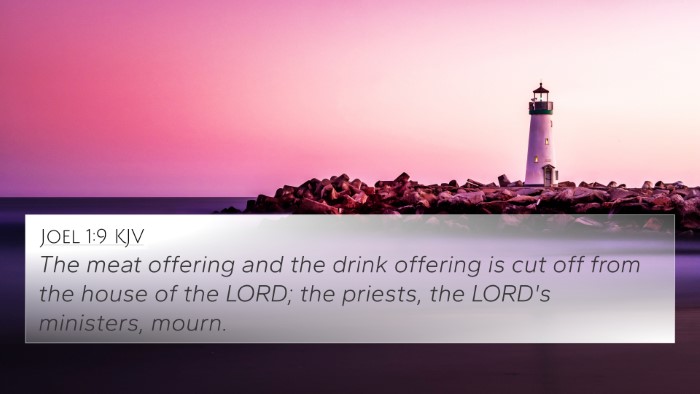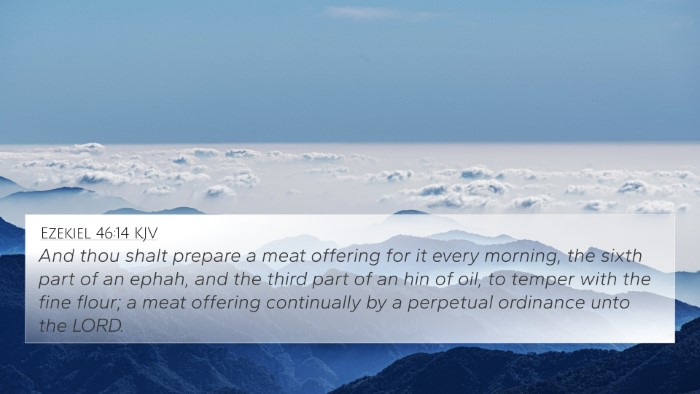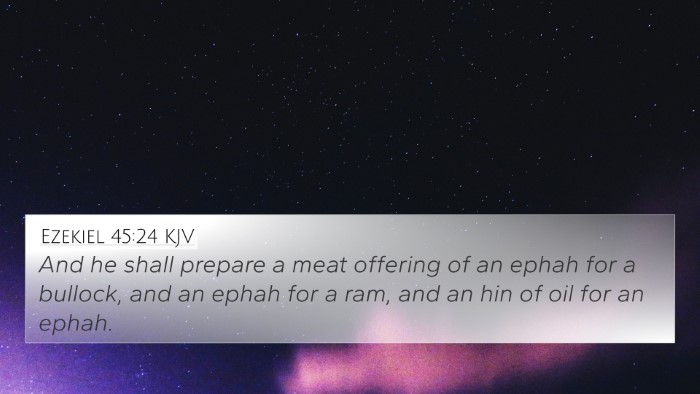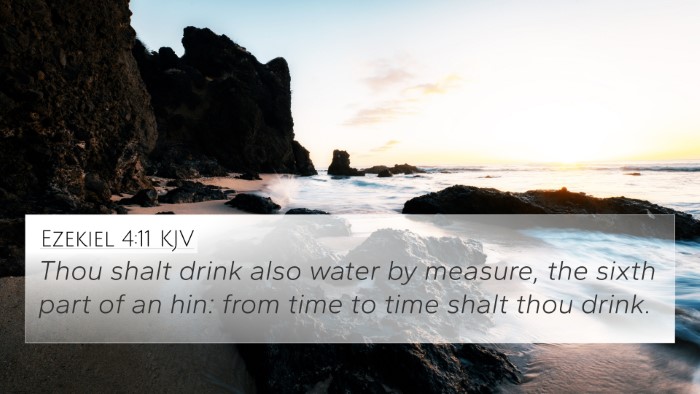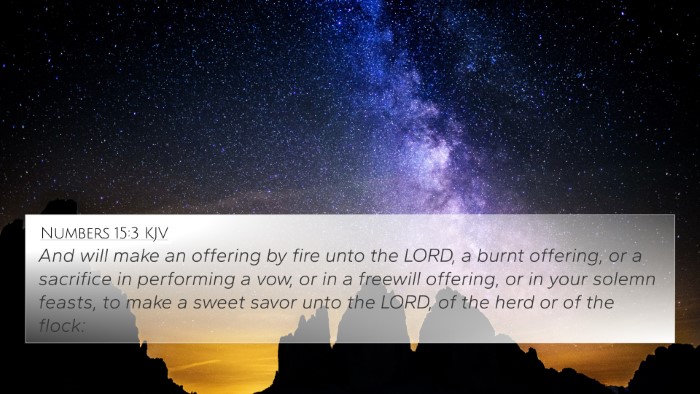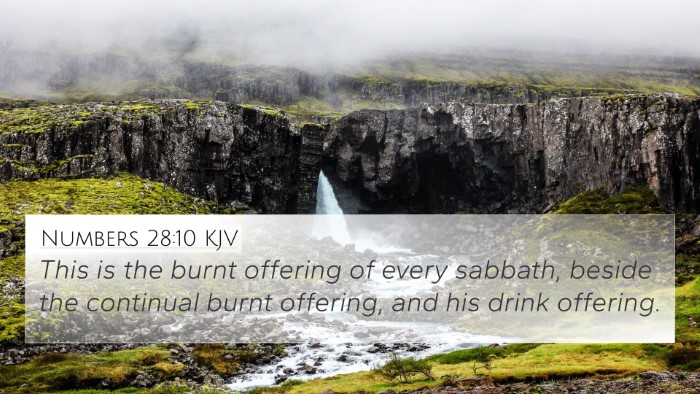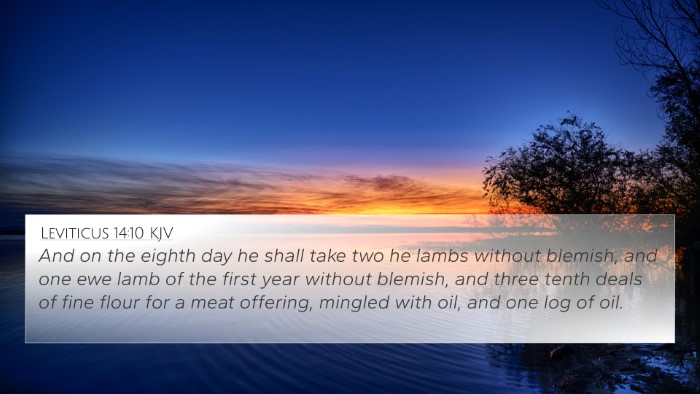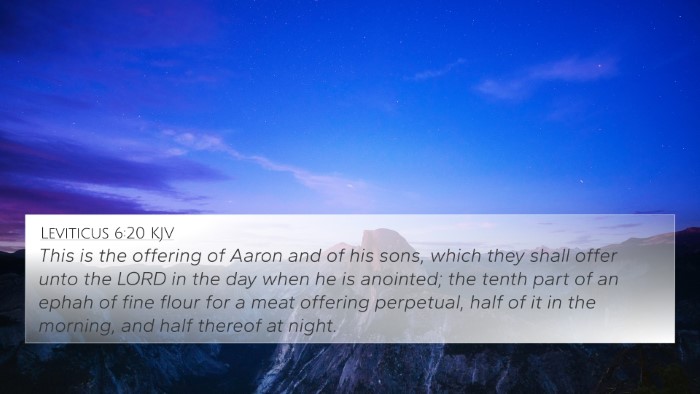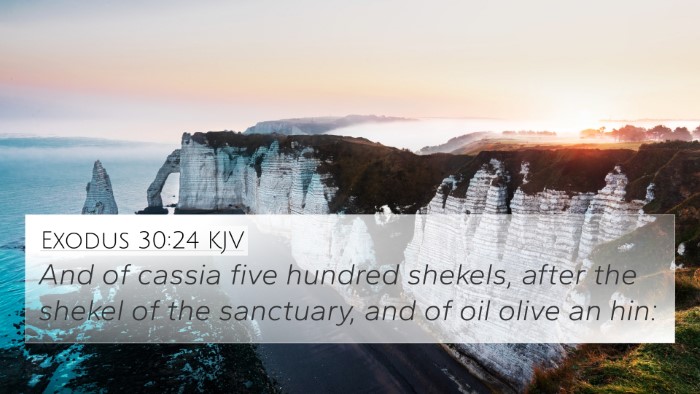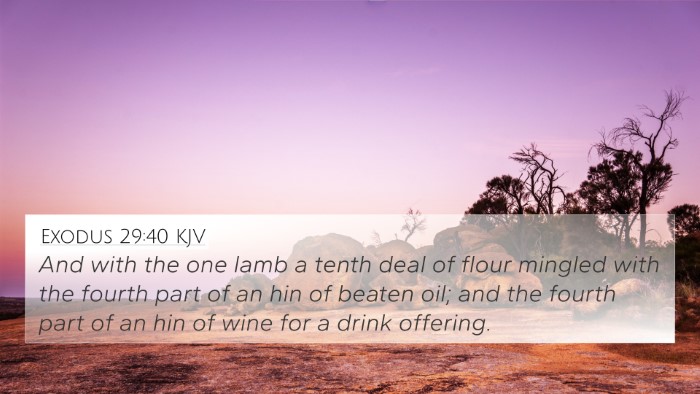Understanding Leviticus 23:13
Leviticus 23:13 states, "And the meat offering thereof shall be two tenth deals of fine flour mingled with oil, an offering made by fire unto the Lord for a sweet savour: and the drink offering thereof shall be of wine, the fourth part of a hin."
This verse outlines specific elements of the offerings that were required during the Jewish feasts, emphasizing the importance of approaching God with the proper reverence and devotion. Below is a summary of insights from public domain commentaries by Matthew Henry, Albert Barnes, and Adam Clarke, combined to explore the theological and practical meanings of this scripture.
Commentary Insights
Matthew Henry's Commentary
Matthew Henry notes that the offerings are significantly detailed in their composition, symbolizing the offering of oneself to God. He emphasizes that the fine flour represents purity and the mingling with oil symbolizes both the presence of the Holy Spirit and the joy in worship. The sweet savour reflects the pleasing nature of the offerings to God.
Albert Barnes' Notes
According to Albert Barnes, this verse is part of the instructions for the feast of Pentecost, where the first fruits are celebrated. Barnes discusses the drink offering, which is significant as it represents joy and gladness in God’s provision. He highlights the fourth part of a hin being a substantial quantity, suggesting a culture of abundance in giving to God.
Adam Clarke's Commentary
Adam Clarke provides a detailed enumeration of ritual details and their importance in maintaining ceremonial holiness. He notes that the two tenth deals of fine flour represent a dedication of effort and resources. Clarke emphasizes the spiritual significance of these offerings, linking them to the broader themes of sacrifice and gratitude in worship.
Cross References
Leviticus 23:13 connects with various other scriptures throughout the Bible, enhancing its understanding through thematic Bible verse connections. Here are some key cross-references:
- Exodus 29:40-41 - Discusses the offerings and their significance in the context of worship.
- Numbers 28:7 - Further details on the offerings made by fire.
- Psalms 51:16-17 - Highlights that God desires a broken spirit over ritual sacrifices.
- Isaiah 1:11 - Critique of meaningless offerings without true devotion.
- Hebrews 9:14 - Mentions the cleansing of the conscience through offerings.
- Romans 12:1 - Calls believers to offer their lives as living sacrifices.
- Philippians 4:18 - Speaks of offerings as a sweet smell to God.
Theological Themes
This verse can be seen as part of a larger discussion on the nature of worship and the way God desires His people to approach Him. By understanding these offerings as symbolic gestures of devotion, we can deepen our theological reflections on:
- The nature of sacrifice - Reflecting the importance of giving in worship, which is echoed throughout the Bible.
- Spiritual joy - The role of the drink offering in symbolizing the joy of a believer's heart in recognizing God’s provisions.
- Overall holistic worship - How the offerings reflect both the physical and the spiritual aspects of worship.
Practical Applications
As modern believers, there are practical applications drawn from Leviticus 23:13:
- Understanding the importance of our offerings—whether time, resources, or talents—as acts of worship.
- Recognizing the significance of approaching God with a sincere heart, not just outward rituals.
- Emphasizing joy and gratitude in worship, mirroring the drink offering's representation of gladness.
Conclusion
Leviticus 23:13, with its focus on the specific compositions of offerings, enriches our understanding of worship in the Old Testament. By studying this verse and its cross-references, we can see the continuity of God's desire for sincere offerings, a theme that resonates throughout the entire Scripture. Engaging with various Bible commentaries can significantly enhance our reading of this verse and the broader context of the biblical narrative, providing valuable tools for Bible cross-referencing and deeper theological study.
Further Study Resources
For those looking to dive deeper into cross-referencing Bible study methods, consider utilizing:
- Bible concordances - To find thematic Bible verse connections.
- Bible cross-reference guides - To assist in tracing similar themes across Scriptures.
- Comprehensive Bible reference resources - To explore detailed cross-references for sermon preparation and personal study.
